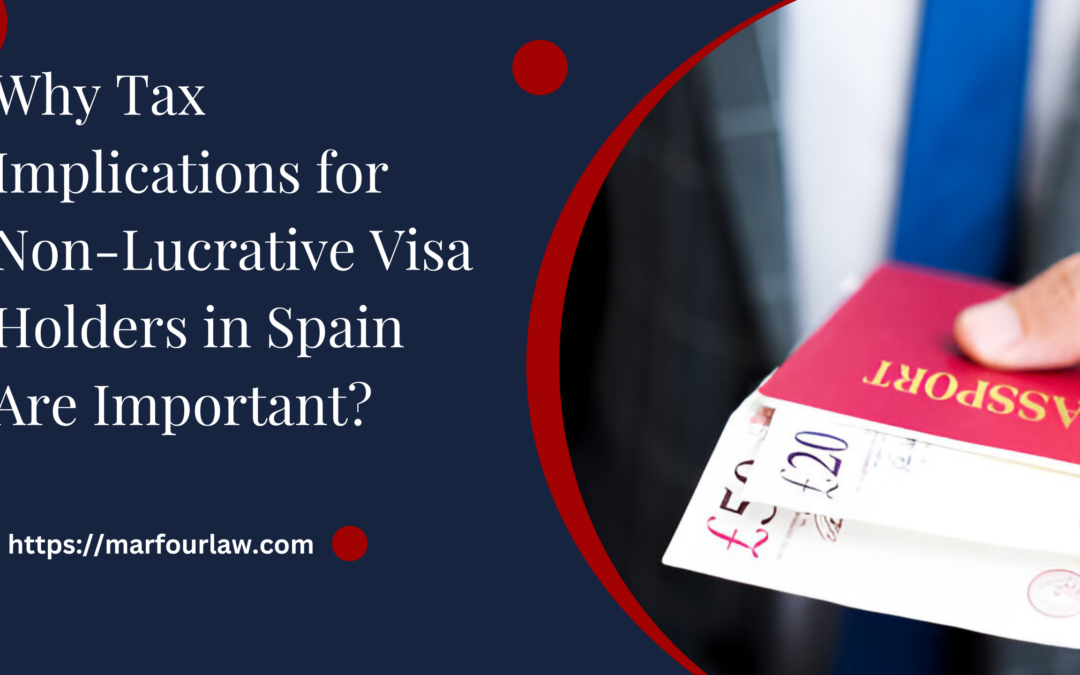When applying for a non-lucrative visa, one of the main concerns people often overlook is the tax implications for non-lucrative visa holders. While this visa is attractive for those who want to live in a country without engaging in work, it comes with several important tax responsibilities. From how long you can stay to whether you’ll be taxed on your worldwide income, this guide will walk you through everything you need to know. Let’s dive into the key tax obligations you’ll face as a non-lucrative visa holder.
What Are the Tax Implications for Non-Lucrative Visa Holders in Spain?
When you hold a non-lucrative visa in Spain, one of the first things to be aware of is your tax residency status. If you live in Spain for more than 183 days in a calendar year, you will automatically be considered a tax resident. This means you’ll need to report your worldwide income, not just what you earn in Spain. Even if your income is coming from abroad, it still counts once you’re a tax resident.
This is a key point to keep in mind because many people think they only have to pay taxes on their Spanish earnings. The 183-day rule can be a game-changer, especially if you have investments or passive income in other countries.
Income Tax for Non-Lucrative Visa Holders
For non-lucrative visa holders, income tax is a significant part of living in Spain. Once you become a tax resident, you’ll be subject to Spain’s progressive tax rates. The more you earn, the higher your tax rate will be. These rates can range from 19% to 47%, depending on your total income.
This tax applies to various forms of income, including employment income, rental income, pensions, and even dividends from foreign sources. If you’ve got multiple income streams, it’s important to be prepared for these taxes, as they can add up quickly.
Wealth Tax in Spain
Wealth tax is another factor to think about. Spain imposes a tax on your total assets if they exceed a certain threshold. Each region has different rules, but generally, the wealth tax applies to assets such as property, investments, and savings. The threshold for non-residents is usually lower, so it’s something that could come into play for many visa holders.
This tax is especially important for those with significant assets, as it’s based on the total value of everything you own, not just your income. If you’ve built up wealth over the years, it’s a good idea to assess whether you’ll be liable for this tax in Spain.
Double Taxation Agreements
If you’re worried about being taxed twice on the same income, Spain has agreements in place with many countries to prevent double taxation. These treaties allow you to offset taxes paid in another country against your Spanish tax bill. However, the process can be complex, and it’s important to have the right documentation to claim this relief.
It’s worth noting that double taxation agreements don’t always cover every situation. You’ll want to consult with a tax expert to ensure you’re making the most of these treaties and aren’t paying more than you need to.
Filing Taxes and Deadlines
As a non-lucrative visa holder, you’ll need to file your Spanish tax return each year, typically before the end of June. The filing process can be a bit daunting, especially if you’re new to the country and still getting used to the language and system. There are specific forms and documents required, and you’ll need to declare all your global income and assets.
Missing deadlines can result in penalties, so it’s crucial to stay on top of your tax obligations. Many people opt to hire a tax advisor to help navigate the process smoothly. While it’s an extra cost, it can save you time and headaches in the long run.
Do Non-Lucrative Visa Holders Have to Pay Taxes on Worldwide Income?
Yes, if you hold a non-lucrative visa in Spain and become a tax resident, you are required to pay taxes on your worldwide income. This means that once you live in Spain for more than 183 days within a calendar year, you will be considered a tax resident. Being a tax resident means that all of your global earnings, not just the income generated in Spain, will be subject to Spanish taxes.

What Counts as Worldwide Income?
Worldwide income includes any money you earn from various sources, whether it’s in Spain or abroad. This could be:
- Employment income: If you work remotely for a company outside Spain, the salary you receive is taxable in Spain.
- Investment income: Dividends, interest, or profits from investments held in other countries will also be taxed.
- Rental income: If you rent out properties abroad, the rental income will need to be declared.
- Pensions and retirement funds: Any pensions or retirement payments you receive from your home country or other foreign sources will be considered part of your taxable income.
Progressive Tax Rates
Once you’re a tax resident, Spain’s progressive tax rates will apply to your worldwide income. These rates start at 19% for lower earnings and can go up to 47% for higher incomes. It’s a sliding scale, so the more you earn, the more you’ll be taxed. Keep in mind that Spain’s rates are some of the highest in Europe, particularly for higher income brackets.
Impact of Double Taxation Agreements
The good news is that Spain has double taxation agreements with many countries, including the U.S. and the U.K. This means you won’t necessarily pay tax on the same income twice. Under these agreements, you may be able to offset taxes you’ve already paid in your home country against your Spanish tax liability.
However, these agreements are not always straightforward. They differ from country to country, and not all types of income are covered. It’s wise to seek professional advice to make sure you’re applying the treaties correctly and not paying more tax than required.
Reporting Foreign Assets
In addition to reporting your worldwide income, Spain requires tax residents to declare their foreign assets through a form known as “Modelo 720.” This includes reporting properties, bank accounts, and investments held outside of Spain if their total value exceeds a certain threshold. Failure to report foreign assets can lead to severe penalties, so it’s essential to stay compliant with these regulations.
Tax Planning Is Key
If you’re planning to stay in Spain long-term, understanding the tax implications is critical to managing your finances efficiently. Whether you have investments abroad, pensions, or rental properties, knowing how Spain will tax your worldwide income can help you avoid surprises. Many people opt for professional tax planning to make sure they are meeting their obligations without overpaying.
Local Taxes vs. Home Country Taxes – What to Expect
If you’re considering a move to Spain on a non-lucrative visa, understanding the tax landscape is crucial. When you become a tax resident in Spain, you’ll encounter local taxes that can differ significantly from what you’re used to in your home country. Let’s break down the differences so you can better prepare for your financial obligations.
Local Taxes in Spain
As a non-lucrative visa holder, once you reside in Spain for more than 183 days a year, you’ll be subject to Spanish tax laws. This means your worldwide income will be taxable. Here’s what you can expect:
- Income Tax: Spain utilizes a progressive income tax system. This means that your tax rate will increase as your income rises, ranging from 19% to 47%. Unlike some countries that have flat rates, this system can lead to higher taxes, especially if you have multiple income sources.
- Wealth Tax: Spain imposes a wealth tax on individuals with assets exceeding certain thresholds. If your total worldwide assets—including real estate, savings, and investments—are above this limit, you’ll need to pay this tax. Each region can set its own rules, so your liability may vary depending on where you live in Spain.
- Capital Gains Tax: Should you sell any assets, such as property or stocks, you’ll be liable for capital gains tax. This tax is generally between 19% and 26%, depending on your profit margin. Keep this in mind if you plan to liquidate investments or sell property.
- Property Taxes: If you own property in Spain, you’ll need to pay an annual property tax called IBI (Impuesto sobre Bienes Inmuebles). This tax is based on the cadastral value of your property and is a recurring expense you should factor into your budget.
Taxes in Your Home Country
While you enjoy life in Spain, you may still have tax obligations to your home country. Here’s what to keep in mind:
- Worldwide Income Tax: Some countries, like the United States, require citizens to pay taxes on worldwide income, regardless of where they reside. This means you’ll need to report your income from both Spain and any foreign sources back to your home country.
- Tax Credits and Deductions: Thankfully, many countries have agreements with Spain to prevent double taxation. If you’re paying taxes in Spain, you may be able to deduct those amounts from your tax bill in your home country. This helps ensure you’re not taxed on the same income in two different jurisdictions.
- Reporting Requirements: You might still be obligated to report foreign accounts or certain types of income to your home country, even if you’re no longer living there. For example, U.S. citizens must report foreign bank accounts if the total balance exceeds $10,000 at any point in the year.
Understanding Tax Treaties
Spain has numerous double taxation agreements in place, which help residents avoid paying tax on the same income in both countries. These treaties can be complex, but they typically allow you to offset taxes paid in Spain against those owed in your home country. Understanding how these agreements work is essential for effective tax planning.
Differences in Tax Structures
Tax structures can vary significantly between countries. Spain’s higher progressive rates and additional wealth taxes might seem daunting, especially if you’re coming from a country with lower tax rates. However, Spain also offers benefits like lower healthcare costs, which can offset some of the financial burdens.
If you’re moving from a country with no wealth tax or significantly lower rates, you might feel a pinch. It’s essential to consider not just the tax implications, but also the overall quality of life and cost of living when making your decision.
Plan for Your Tax Situation
To ensure compliance with both Spanish and home country tax laws, consider consulting with a tax professional. Navigating the tax landscape in two countries can be challenging, and a knowledgeable advisor can help you optimize your tax situation and avoid pitfalls.
Understanding these tax implications will help you manage your finances effectively and make the most of your time in Spain. At Marfour International Law Firm, we’re here to guide you through the complexities of international taxation and ensure you’re well-informed every step of the way.
Importance of Tax Advisors for Non-Lucrative Visa Holders
When relocating to Spain on a non-lucrative visa, one of the most crucial aspects to consider is your tax situation. The tax landscape can be complex, and it’s essential to navigate it correctly to avoid potential pitfalls. This is where tax advisors come into play. Let’s explore why having a tax advisor is vital for non-lucrative visa holders living in Spain.

Understanding Tax Residency
First off, it’s important to understand what tax residency means. As a non-lucrative visa holder, if you spend more than 183 days in Spain during a tax year, you will likely be considered a tax resident. This designation means you’ll be subject to Spanish tax laws, which can significantly affect your financial situation. A tax advisor can help clarify your residency status and what it means for your tax obligations.
Expertise in Local Tax Laws
Spain has its own set of tax laws, and they can be quite different from those in your home country. A tax advisor with expertise in Spanish taxation can provide you with detailed information about local tax requirements. They can guide you through Spain’s progressive income tax system, wealth tax, and capital gains tax, helping you understand your liabilities and avoid any surprises come tax season.
Navigating Double Taxation Treaties
One of the biggest concerns for non-lucrative visa holders is the risk of being taxed in both Spain and their home country. Thankfully, many countries have double taxation treaties in place with Spain to prevent this scenario. A knowledgeable tax advisor can help you understand these treaties, ensuring that you take advantage of any credits or deductions available to you. This means you won’t pay more tax than necessary on the same income.
Planning for Future Income and Assets
As your life in Spain evolves, your financial situation may change. Whether you plan to invest, buy property, or generate income, a tax advisor can help you plan effectively. They’ll provide guidance on how different investments may be taxed, which can influence your decisions. By considering the tax implications upfront, you can make more informed choices that align with your financial goals.
Compliance and Reporting Obligations
Living abroad comes with a host of reporting requirements, especially if you’re a citizen of a country like the United States. For instance, you may need to report foreign bank accounts or assets. A tax advisor can help ensure that you meet all compliance requirements, avoiding hefty fines or legal issues down the line. They can keep you informed about changes in regulations that may affect your obligations.
Peace of Mind
Perhaps one of the most valuable benefits of working with a tax advisor is the peace of mind it brings. Taxes can be complicated, and the fear of making mistakes can be overwhelming. Having a professional by your side can alleviate that stress. You’ll know you’re making informed decisions based on the latest tax laws and regulations.
Customized Financial Strategies
Every individual’s financial situation is unique. A tax advisor will take the time to understand your specific circumstances, goals, and concerns. They can create customized tax strategies that cater to your needs, helping you minimize your tax liability while ensuring compliance with local laws. This personalized approach can lead to better financial outcomes and a smoother experience living in Spain.
In summary, if you hold a non-lucrative visa and are living in Spain, engaging a tax advisor is not just a good idea; it’s essential. They can help you understand your tax residency, navigate local laws, take advantage of double taxation treaties, plan for your financial future, ensure compliance, and provide peace of mind. At Marfour International Law Firm, we’re committed to helping you navigate the complexities of international taxation and ensuring your financial success in Spain.
Frequently Asked Questions
Here are some of the most common questions non-lucrative visa holders have when it comes to taxes.
Do I Have to Pay Taxes in My Home Country?
It depends. If your home country taxes on worldwide income, such as the United States, then yes, you still need to file taxes. Otherwise, it may vary based on your tax residency.
How Can I Avoid Double Taxation?
The best way to avoid double taxation is through double taxation treaties. Check if your home and visa countries have such an agreement.
Can I Be Taxed on My Savings?
If you become a tax resident, some countries will tax your investment earnings and capital gains. However, your actual savings in the bank usually aren’t taxed unless they generate interest.
Conclusion
The tax implications for non-lucrative visa holders are extensive and can be quite complicated. From determining your tax residency to understanding your worldwide income obligations, there are many aspects to consider. Make sure to plan ahead, consult tax professionals, and carefully manage your time spent in the country to avoid unnecessary tax burdens.

